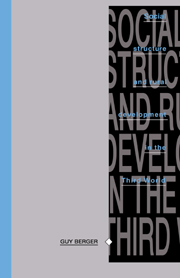2 - Mode of production, surplus and capitalist development
Published online by Cambridge University Press: 17 September 2009
Summary
The concept of mode of production
The concept of ‘mode of production’ is central to analysing the economic relations and associated patterns of development. For Marx:
The direct relationship of the owners of the conditions of production to the direct producers … always naturally [corresponds] … to a definite stage in the development of the methods of labour and thereby its social productivity.
(1974: 291)In my terminology, we may discern here a proposition that there is a correspondence between relations of production and forces of production. To this intermeshing also corresponds a level of productive capacity. In Marx's view, there is thus a limited functional compatibility between these elements (see also Godelier, 1972: 349; Marx, 1976b: 1024–5, 1035). In my view, it is when the correspondence between relations and forces of production structures spans Moments A, B and C – and is reproduced as such in conjunction with system dynamics deriving from the whole – that a ‘mode of production’ is constituted. This is what makes it possible to identify, for example, a capitalist mode of production with capitalist relations of production as opposed to a structure which might involve some seemingly capitalist features but does not constitute a mode of production. An articulated combination of a homogeneous relations of production structure with a homogeneous forces of production structure is the basic structure of the general concept of mode of production.
- Type
- Chapter
- Information
- Publisher: Cambridge University PressPrint publication year: 1992



